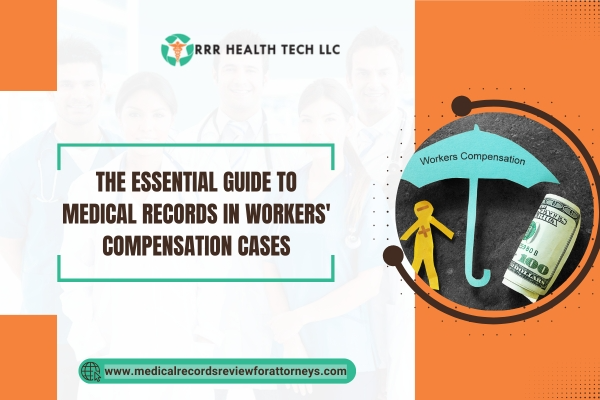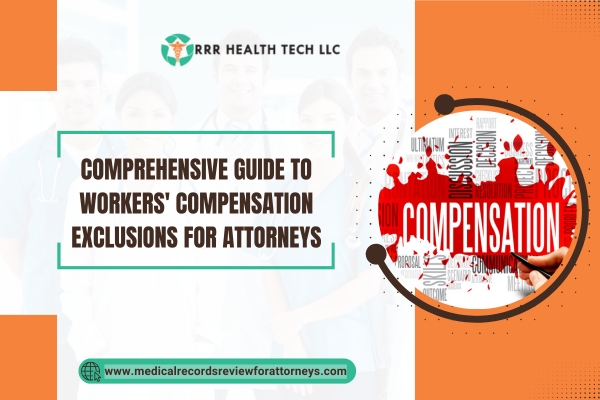
Introduction
Legal practitioners representing injured employees have to deal with workers compensation claims management as part of their legal practice. In order to be prepared to deal with the changing world of workers’ compensation. It is essential to know some practices that work in such scenarios. This paper focuses on the functions related to best practices in management of workers’ compensation claims; particularly engaging medical records review services to assist attorneys throughout the country.
Understanding Workers’ Compensation Claims
What is Workers’ Compensation?
Workers’ compensation insurance ensures that an employee who gets injured while at work is able to get medical care and also earned wages until they recover from the injury. Its main objective was to safeguard the employees’ care they required after being injured and the employers’ exposure to risk.
The Importance of Effective Claims Management
Efficient claims management is a top concern for ensuring that injured workers are paid for their injuries as expeditiously as possible. It necessitates an orderly method of dealing with the claims, including how the claims are reported, and how they are eventually settled. With effective management in place, costs can be minimized, the level of employee morale improved, and the legal position bettered.
Key Components of Workers’ Compensation Claims Management
1. Initial Reporting and Documentation
Importance of Accurate Reporting
Recording the details of an accident or an incident in a workplace as precisely as possible is the prerequisite of the entire claims cycle and all activities related to it. Attorneys must enforce compliance of the practitioners within their areas of practice. If any document is required, an attorney must see that it is available and on time.
Role of Medical Records Review
Medical records review services are essential when one has to survey the correctness of the medical documents. Physicians are often employed as experts in medical record analysis and claims filing. Their job is to check the accuracy and relevance of record content with the claim submitted.
2. Communication with All Parties
Engaging with Clients
Clients must be kept in the loop as much as possible. Avoiding deciphering and explaining what claims are worrying the client and even upsetting the client’s sense of neutrality.
Collaboration with Medical Professionals
Medical practitioners need to be actively engaged by the attorneys in order to obtain adequate and thorough medical records. The strength of the claim will improve and so will the post adjudication settlement process.
3. Thorough Investigation of Claims
Importance of an Investigation
An investigation of the incident that is the subject of the claim is extremely important. In this context, an investigation means obtaining witness statements and consulting with a claims adjuster to consider the safety measures that were in place at the time of the accident.
Employing Medical Records Review
Medical record review helps i. Determine whether the claimant had any previous medical problems. Or as the claimant claims, had no earlier medical records. This information may be vital in the case.
4. Timely Follow-Up and Case Management
Milestones
Determining appropriate benchmarks for each phase under an attorney’s supervision concerning the merits should be useful in ensuring efficient handling of the claims. Follow up at regular intervals helps to ensure that every single feature of the claim is addressed.
Technology Usage
With the assistance of case management software, the attorney is able to work in an organized manner and attend to deadlines in an organized manner.
Best Practices for Attorneys in Workers’ Compensation Claims Management
1. Develop a Comprehensive Strategy
Creating a detailed strategy for managing workers’ compensation claims can significantly improve outcomes. This strategy should include:
- Assistance on The Claim: Try to substantiate the claim at a very early stage.
- Resources Required: Analyze what resources would be required for effective management of the case.
- Duration of each phase: Appraisal of the business to set the duration of completion of each stage of the claim.
2. Invest in Medical Records Review Services
Partnering with a reputable medical records review company can enhance the quality of evidence presented in claims. These services can:
• Information about Important Medical Events: Important medical events that support the claim will be pointed out.
• Ensure Compliance: Make sure all medical documentation is available in the legal required form.
• Facilitate Expert Testimony: Offer valuable insights that can be useful in a court of law.
3. Stay Updated on Legal Changes
The area of workers’ compensation is continually changing. Attorneys should be aware of the law and other regulatory requirements in the processes that might relate to claims management. Continuous education and practice can put the attorneys within the standards and practices of efficiency.
4. Foster Relationships with Insurance Adjusters
Effective working relationships with the insurance adjusters can also make the process of reaching agreements easy. Good information flow will also cut on the time taken to resolve issues and improve the clients’ situations.
Common Challenges in Workers’ Compensation Claims Management
1. Delays in Claims Processing
Late processing could be due to documents not fully being submitted or the claims are challenged as being genuine. The attorney should take care of this by seeing to it that all the required information is delivered on time.
2. Disputes over Medical Evidence
Medical records are a necessity of any claim, and disputes over the provision of these documents could have a negative effect on the claims. Managers in charge of medical records reviews could help resolve these issues by providing an impartial review of the medical documents.
3. Navigating Complex Regulations
Workers’ compensation laws vary by state, and navigating these regulations can be challenging. Attorneys should familiarize themselves with the specific laws governing their jurisdiction to avoid pitfalls.
Case Studies
Case Study 1: Overcoming Documentation Challenges
Overview: A construction worker’s lawyer had some difficulties because his client’s physicians did not complete all necessary medical records.
Challenges: Due to the initially provided medical treatment reports, there was no mention of how severe the patient’s injury was and what type of treatment was given. These factors impaired the functions of the claim management process.
Solutions: The lawyer hired a medical records retrieval service with the intention of achieving better documentation of the injury as well as obtaining more relevant medical history. The service generally supplied the attorney with the necessary patient’s history and treatment documentation.
Compensation: Due to the comprehensive documentation the attorney was able to put forward arguments facilitating the settlement so that the construction worker could receive compensation for lost earning and medical costs, thus making the case a success.
Case Study 2: Navigating Complex Regulations
Overview: An attorney representing an injured healthcare worker who had to lift a patient encountered problems in states with different regulations about patient’s injuries.
Challenges: The particular state regulations deciding the various compensation points a workers’ compensation would meet depending on the states of the clients diffused the eligibility regarding the claim and the battles one would have easily won.
Solutions: The attorney made use of a medical records review service in order to demonstrate that all medical evidence was properly tailored to the specifics of this particular state territory. The assistance provided also related to comparable cases, allowing the lawyer to reinforce his strategy.
Compensation: Because of the well-articulated claim for compensation, the lawyer made sure the client was able to get a decent settlement which included covering all the medical expenses as well as the future cost of care.
Conclusion
Adroit management of workman’s compensation claims is important for the attorneys who handle the cases of the injured workers. Best practices suggest that lawyers deepen their case success rates by paying attention to such factors as the revision of the medical records and changes in law. The careful preparation of clinical files, comprehensive plans, and effective interaction will not only serve the interests of the clients, but also strengthen the position of the lawyer in the market.


